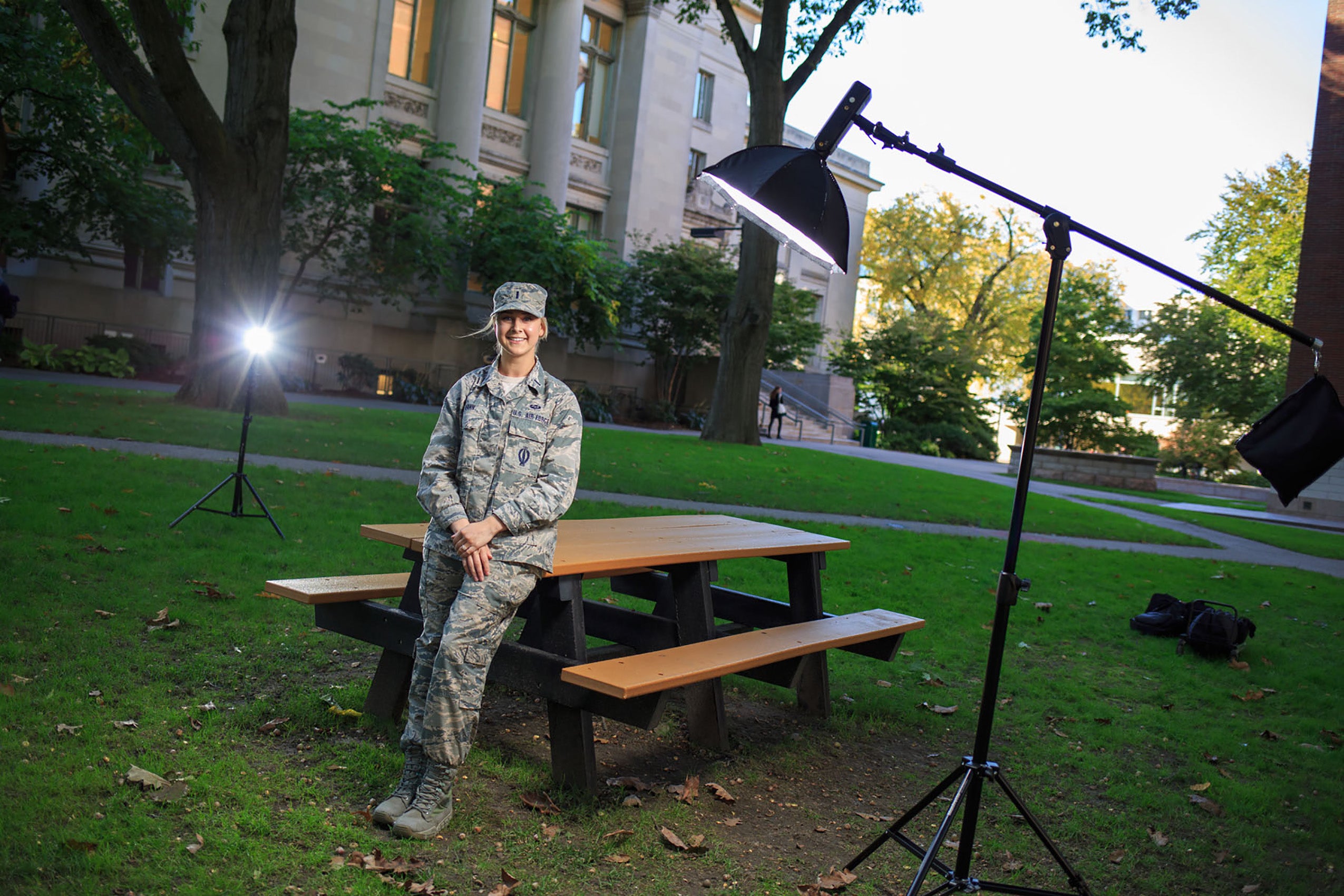Hailing from all military services and both the officer and enlisted ranks, current and former members of the armed forces form an important and growing community at Harvard Law School, enriching the campus and elevating awareness about the legal and policy issues affecting those who served, and the significance of law in contemporary warfare. During the 2018-2019 academic year, 45 U.S. military veterans were enrolled at HLS. The 26 U.S. military veterans and current members of the military in this year’s 1L and LL.M. class represent the highest number in recent years.
Several of these students are part of the Yellow Ribbon Program, which helps fund veterans’ tuition and expenses. Harvard’s Black Family Fellowship also provides funding for up to 25 students at HLS, Harvard Business School, and Harvard Kennedy School. To further grow its veteran population, HLS recently partnered with the Service to School’s VetLink program, which connects transitioning military veterans seeking higher education with partner schools. On Sept. 27, the school hosted the first-ever Military Prospective Student Day.
Below, four members of this year’s class share their experiences in the military and at HLS.
Riley Vann ’22, U.S. Air Force
Being in control of U.S. nuclear weapons taught Vann how to cope—and maintain leadership—under pressure

Credit: Heratch Ekmekjian
Seventy to 80 feet underground for 24 hours at a time in a room less than 200 feet square, for more than two years Lt. Riley Vann ’22 kept careful watch over 50 Intercontinental Ballistic Missiles (ICBMs) with nuclear capabilities that are part of the United States nuclear weapon defense force.
As a U.S. Air Force Nuclear and Missile Operations officer, or missileer, Vann, who matriculated at Harvard Law School this year, was one of 90 missileers on duty at any given time in 45 command sites in North Dakota, Montana, and Wyoming. Working in two-person teams, missileers are charged with guarding and maintaining the country’s 450 ICBMs. And, should the order come from the president, they are tasked with helping launch them.
Brandon Ricaurte ’22, U.S. Army Special Forces
‘I knew if I didn’t join, I’d regret it for the rest of my life.’

Credit: Heratch Ekmekjian
With a lifelong commitment to helping people in need, especially those in impoverished countries, Brandon Ricaurte ’22 joined the U.S. Army to become a Special Forces soldier, whose mission is to fight for those who cannot fight for themselves. As a 2006 graduate of Princeton University, Ricaurte was eligible to become an officer. But he chose to forego a commission and joined as an enlisted soldier because it would guarantee him the opportunity to try out for Special Forces, also known as the Green Berets, one of the most difficult and prestigious units in the military.
“I liked that they worked abroad with indigenous forces and that they’re put in really dangerous situations where conventional forces can’t go,” says Ricaurte, who speaks Mandarin, Spanish, Portuguese, and two Persian dialects. “It wasn’t just brute force or those other stereotypes about the military, but instead it was about working with countries and people to find solutions to complex problems.”
Ivanka Canzius ’22, U.S. Army
‘Statistics show that a person who grew up like me should be drug addicted or maybe dead.’

Credit: Heratch Ekmekjian
Born in Madrid, Spain, to heroin-addicted parents who neglected and abused her, and as a teenage immigrant who spoke no English when she arrived in Texas in the late 1990s, Ivanka Canzius ’22, a U.S. Army veteran, has walked a long and rocky path to Harvard Law School.
“As an orphan child, Hispanic woman, female soldier, disabled vet, divorced wife, and single mother, I have suffered more than anyone should. Nonetheless my story is a happy one,” Canzius told a packed audience on Oct. 2 at the student speaker series “HLS Talks,” for which her 1L section nominated her to share her life story. “I am not going to lie, it took me a long time to feel at peace with the things that happened to me.” Yet those very experiences, she added, “helped me become the person you see today.”
Anthony Sham LL.M. ’20, U.S. Navy
Changing the landscape in Afghanistan, one radio broadcast at a time

Credit: Heratch Ekmekjian
Lieutenant Commander Anthony “Tony” Sham LL.M. ’20 was just three years out of law school when he deployed to Logar Province in Afghanistan, one of the most dangerous regions in the country, to serve as primary legal adviser to American military leaders on matters of Afghan criminal procedure, Afghan constitutional law, and evidence-based operations. While assisting the local government in prosecuting terrorists, Sham worked in partnership with Afghan prosecutors, judges, and security forces, and he developed a curriculum to educate Afghan National Police and Afghan National Army on Afghan substantive law, legal search and seizure procedures, and police tactics.
Carrying that level of responsibility so early in his career—and getting lots of courtroom experience, as he did in his first military assignment, as a criminal defense attorney—was exactly why Sham, a native of Dallas, joined the U.S. Navy right out of Baylor Law School. This year, Sham is getting his LL.M. at Harvard Law School with a focus on international law and national security law, with plans of becoming a legal adviser to senior leaders at Department of Defense.
